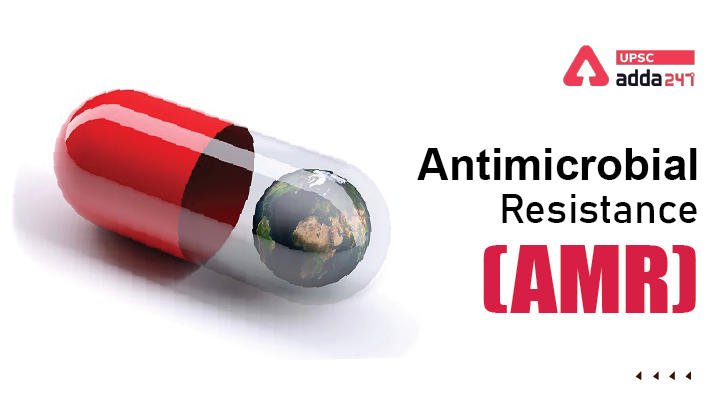Table of Contents
Antimicrobial Resistance in India
Antimicrobial Resistance is an important topic for UPSC exam. Antimicrobial resistance can be grouped under both current affairs and static topic for UPSC exam. For example: According to a recently conducted research by University of Oxford, a bacterium called Pseudomonas is being treated with Colistin, a ‘last resort’ antibiotic for patients who have developed multi-drug resistant infections. Considering its growing impact on the lives of human beings, plants and animals, we will try to cover everything about antimicrobial resistance that is important for UPSC exam.
What is Antimicrobial Resistance?
- Antimicrobial Resistance meaning: Antimicrobial resistance (AMR) is the ability of microorganisms to persist or grow in the presence of drugs designed to inhibit or kill them.
- These drugs, called antimicrobials, are used to treat infectious diseases caused by microorganisms such as bacteria, fungi, viruses and protozoan parasites.
- Antimicrobial resistance (AMR) is a major global threat of increasing concern to human and animal health. It also has implications for food safety, food security and the economic wellbeing of millions of farming households.
What causes AMR
Antibiotic resistance develops naturally in bacteria. However, our actions can increase resistance developing and spreading. This can happen:
- when human and animal health professionals over prescribe antibiotics
- when people don’t take antibiotics as directed
- due to poor hygiene and a lack of infection prevention and control e.g. not washing hands properly
- due to people travelling around the world, spreading resistant bacteria
Implication of AMR
- When microorganisms become resistant to antimicrobials, standard treatments are often ineffective, and in some cases, no drugs provide effective therapy. Consequently, treatments fail.
- This increases illness and mortality in humans, animals and plants.
- For agriculture, this causes production losses, damages livelihoods and jeopardizes food security.
- Moreover, AMR can spread among different hosts and the environment, and antimicrobial resistant microorganisms can contaminate the food chain.
Reasons of AMR Spread
- Antibiotics consumption by humans: Unnecessary use of antibiotics fixed dose combinations could lead to increased resistance in human beings. Issues like self-medication, not having proper knowledge of when to use antibiotics also contributes significantly to the cause.
- Social cause: Incidents like mass bathing in a river, unhygienic practices followed by travellers could also lead to antimicrobial resistance.
- Use in poultry: Antibiotics are used for growth of poultry industry. It further increases AMR in human beings.
- Pharmaceutical industry pollution: The wastewater effluents from the antibiotic manufacturing units contain antibiotics, leading to contamination of rivers and lakes.
- Untreated waste: Untreated disposal of sewage water bodies leads to contamination of rivers with antibiotic residues and antibiotic-resistant organisms.
What is Red Line Campaign?
- In 2016, India launched a Red Line campaign began marking prescription-only antibiotics with a red line to curb their irrational use and create awareness on the dangers of taking antibiotics without being prescribed.
Recommendations for AMR
- Improve awareness and understanding of AMR through effective communication, education, and training
- Strengthen knowledge and evidence through surveillance
- Reduce the incidence of infection through effective infection, prevention, and control
- Optimize the use of antimicrobial agents in all sectors
- Promote investments for AMR activities, research, and innovations
- Strengthen India’s leadership on AMR by means of collaborations on AMR at international, national, and sub-national levels.
Read current affairs for UPSC





 TSPSC Group 1 Question Paper 2024, Downl...
TSPSC Group 1 Question Paper 2024, Downl...
 TSPSC Group 1 Answer key 2024 Out, Downl...
TSPSC Group 1 Answer key 2024 Out, Downl...
 UPSC Prelims 2024 Question Paper, Downlo...
UPSC Prelims 2024 Question Paper, Downlo...
